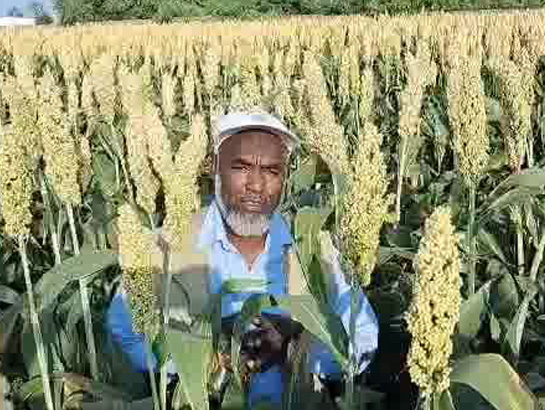HarvestPlus’ breakthrough collaborative work with the International Crops Research Institute for the Semi-Arid Tropics (ICRISAT) in India on zinc-enriched sorghum is now allowing the adoption of zinc enriched sorghum in Saudi Arabia and Sudan—two countries confronting high levels of micronutrient deficiency and food system stress. The expansion marks a critical step in scaling biofortified crops from a national success to a global solution for micronutrient deficiency and food insecurity.
ICSR 14001, a biofortified sorghum variety developed by ICRISAT under the HarvestPlus sorghum biofortification project, is a cost-effective and sustainable solution to address micronutrient deficiencies, particularly iron and zinc, in India and other dryland countries. Developed through conventional breeding, the variety delivers 50 percent more zinc and 30 percent more iron than conventional varieties—nutrients essential for immune health and cognitive development.
In addition to delivering high grain yields, enhanced nutritional properties, including iron (45 parts per million) and zinc (32 ppm), ICSR 14001 also boasts a higher protein content (11.9%) and lower phytate levels (4.1 mg per 100g) compared to conventional varieties, providing more absorbable nutrients to combat deficiencies.
The success in India provided a working model: the use of public-sector research to breed nutrient-rich varieties, validate health impact, and integrate into farming and food systems. This model is now being adapted in new contexts.
In Saudi Arabia, where arid conditions limit crop options, sorghum is increasingly important for food security. The Food and Agriculture Organization of the United Nations (FAO) and ICRISAT are supporting national research institutions to test and adapt resilient, high-yielding, zinc sorghum varieties using Indian germplasm. The goal is to adapt cultivation to local ecologies and practices, and reduce dependence on imports while tackling widespread zinc deficiency.
In Sudan, sorghum is a staple, but malnutrition—especially zinc deficiency—remains high. Building on India’s model, HarvestPlus is supporting CGIAR centers to introduce and multiply biofortified sorghum varieties suitable for local agroecological zones in Sudan. These efforts aim to improve both yields and nutrition outcomes among vulnerable populations.
Scientific Validation
A 2025 publication in Frontiers in Nutrition further validated the ICSR 14001 acceptability in Sudan. Researchers engaged 100 participants (aged 18–75 years) who assessed traditional kisra (a Sudanese flatbread) prepared from Dahab (ICSR 14001 in Sudan) using two methods: the 9-point hedonic scale (1 = “dislike extremely,” 9 = “like extremely”) and the Rate-All-That-Apply (RATA) methodology. As a result, the ICSR 14001 cultivar received the highest overall liking score of 8 (“like very much”). Additionally, RATA identified the golden-brown color, soft texture, and mild nutty flavor as key preference drivers for this variety.
Additionally, the ICRISAT case study highlights the collaborative model that made this possible: demand-led breeding, farmer engagement, effective seed system, and alignment with national nutrition policies. This model has since become a template for replication in other sorghum-growing nations.
The Way Forward
The expanding footprint of biofortified sorghum from India to Saudi Arabia and Sudan is more than a technology transfer. It signals a new era for nutrition-enriched staples. As climate change and food insecurity intensify, crops like biofortified sorghum—resilient, nutritious, and locally accepted—will be essential tools in the global fight against hidden hunger.
HarvestPlus remains committed to working with national governments, research institutions, and the private sector to bring the benefits of biofortified crops to more farming families and communities worldwide. Meanwhile, ICRISAT’s farmer-centric, science-driven approach focused on developing climate-resilient crop varieties demonstrates its unwavering dedication to transforming dryland agriculture.
